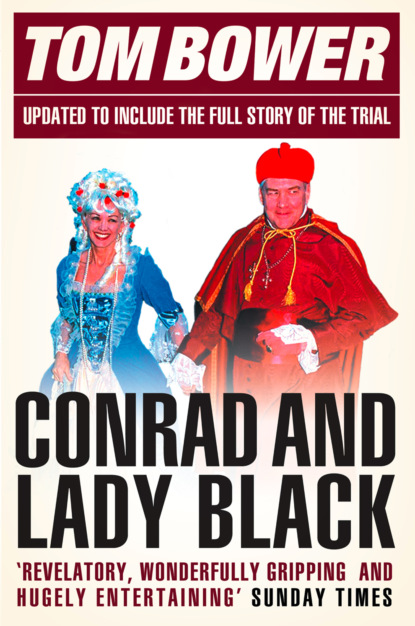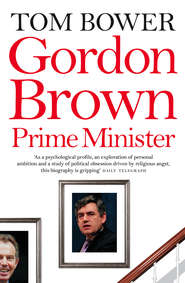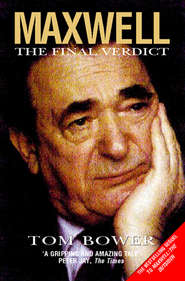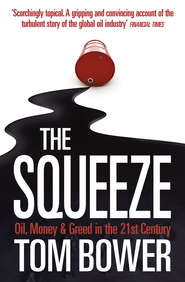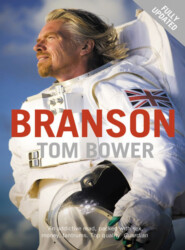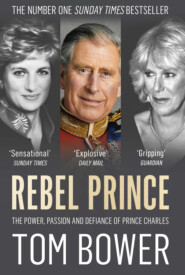По всем вопросам обращайтесь на: info@litportal.ru
(©) 2003-2024.
✖
Conrad and Lady Black: Dancing on the Edge
Настройки чтения
Размер шрифта
Высота строк
Поля
(#litres_trial_promo) Fixed firmly on the right wing, he was on the losing side of the Conservatives’ defeat in Canada’s 1972 general election by Pierre Trudeau, a popular Liberal who, as Black saw it, campaigned against America and capitalism and in favour of the East European Communist states. In Black’s opinion, Trudeau, ‘more than anyone, turned Canada into a people of whining, politically conformist welfare addicts’.
(#litres_trial_promo) Cut off from Canada’s mainstream politics, Black felt surrounded by Quebec’s aggressive nationalists and anti-Vietnam war deserters from America, whom he scorned as ‘insolent and contemptible’.
(#litres_trial_promo) Conventional and right-wing, Black focused his support on the conservative rich. Supporting minority causes appealed to a man who identified his own plight with underdogs. In a reflection of his own unpopularity at school, he sought to discover the goodness in other disliked personalities. That quest presented a contradiction. While venerating Roosevelt, Lincoln and Napoleon, he also pleaded for the understanding of charlatans, especially those symbolising the tradition of Huey Long, the notoriously corrupt but populist Governor of Louisiana in the 1920s and thirties.
Searching for other lost causes, Black alighted on the life and career of Maurice Duplessis, the dominating political leader of Quebec from 1936 to 1959. In popular opinion, the former Attorney General and Premier was condemned as a rude, drunken, corrupt dictator who ruled the province as a quasi-fascist in alliance with the Catholic Church. To resurrect Duplessis’s reputation, and in the process to rescue his own appalling academic record, Black registered at McGill University after finally graduating in law to produce a thesis for an MA degree about the rogue’s life.
Diligently, Black obtained exclusive access to Duplessis’s private papers, and fleshed out the background of the era by interviewing Duplessis’s contemporaries. In pursuit of the truth he travelled to Cameroon to meet one of them, Cardinal Paul-Émile Léger, an eloquent French Canadian missionary. For days they sat in the African bush discussing religion, poverty, life and the fight against disease. Entranced by Léger’s intellect, self-denial and altruism, Black could have been influenced by his understanding of morality, the poor and society. Instead, while he found a new hero, whom he would nominate for the 1973 Nobel Peace Prize (it was won by Henry Kissinger), he rejected the purity of Léger’s philosophy. The encounter in Africa was nevertheless a turning point. Inspired by Léger, and with the help of Bishop Carter of London, Ontario, he witnessed the power of the pulpit. Rather than being the enemy of authority, Black was transformed into a man of authority himself. The confirmation of his conversion was the conversation he began with God. In this continuing dialogue, Black would consult the Almighty and be reassured that whatever course of life he decided upon – any plan, ruse or conspiracy – would improve mankind. How far, he would ask, could he go without becoming unstuck? ‘If I go so far, will you still love me?’ His Maker’s approval was crucial if Black was to face down those who vilified him. And God always gave His approval. The integrity of Black’s credo was the life of Duplessis, who had also suffered personal abuse. Through that corrupt leader’s life, Black sought the answers to his own purgatory, and he was rewarded. His vilifiers, God assured him, would have to answer for their lack of faith in Himself.
On his return to Quebec from Africa in 1971, Black began his attempt to restore Duplessis’s reputation. ‘Much of what his critics decried as dictatorship and corruption was really a puckish love of farce,’ wrote Black, who credited Duplessis’s authoritarianism with building new roads and power plants. ‘Maurice Duplessis had too great a sense of the farcical to be arrogant,’ he added admiringly about a politician who accumulated an estimated C$100 million from corrupt payments. In an exhaustive seven-hundred-page text, Black suffocated the reader with endless quotations intended to support every argument in Duplessis’s favour. Unable to focus on the essential facts and crystallise both sides of the argument, the reader was exposed to a tidal wave of prejudice.
After reading Black’s thesis, Ramsay Cook, McGill University’s external examiner, criticised the apparent rehabilitation of Duplessis. He brushed aside the smokescreen of Black’s elephantine effort, and identified the flaws in his scholarship and the fallacy of his conclusions. Black’s belief that history was determined by leaders, not by mass movements or a battle of ideologies, was, Cook declared, as unconvincing as his undisguised admiration of dishonest power-brokers. In particular, Cook was unsettled by Black’s excusing of Duplessis’s criminal character, and he was minded to block the award of the MA. In order to secure his degree, Black had no alternative but to make the necessary alterations, although his anger about Cook’s ‘offensive’ opinions and ‘fairy-land view of Quebec’ reflected his intolerance of criticism. In 1976 the thesis would be published as a 684-page book.
(#litres_trial_promo) Inevitably, Cook was asked by a newspaper, the Toronto Globe and Mail, to write a review. Unhesitatingly, he expressed his dislike of the book’s unstructured length and verbosity. ‘Anyone,’ he wrote, ‘who can endure this ramshackle volume to the end will likely conclude that though … Duplessis triumphed rather easily over most of his enemies, he has finally come a cropper in the hands of an admiring biographer.’ Black was incensed. ‘A slanted, supercilious little twit’, he called Ramsay, after personally confronting the newspaper’s publisher. Black’s modest manner hid violence towards anyone questioning his work; he damned anyone who questioned his sympathy as a ‘quasi-fascist Jesuit myth-maker’ or an ‘illiterate bootlicker’.
(#litres_trial_promo) His self-esteem led him to neglect compromise in his arguments. To prove his superiority he even bought substantial quantities of his book in order to conceal its sluggish sales.
Similar aggression was directed against the Quebec nationalists after the Liberal Robert Bourassa won the 1970 election to become the province’s Premier. Contrary to his election pledges, Bourassa abolished English as an official language, discriminating against English Canadians. There was no future for Black in a state intent on separation from the country. Damning the ‘hypocrisy, narcissism and obfuscation’ of the French Canadians and mocking the placid English-speaking community as ‘gin-swilling grumblers of no consequence’,
(#litres_trial_promo) he resolved, after eight years in Montreal, to return to Toronto. The notoriety he had gained after his expulsion from three schools had, he assumed, been forgotten. He arrived in the English-speaking city in July 1974 as a comparative stranger.
Conrad Black’s homecoming was opportune. Argus’s finances were deteriorating, and relations among the company’s ageing directors had become fraught. Bud McDougald and E.P. Taylor, while still enriching themselves at Argus’s expense, had become bitter rivals. Much to McDougald’s dissatisfaction, Taylor had been encouraging Paul Desmarais, the controller of the multi-billion-dollar Power Corporation, to make a bid for Argus. Desmarais’s failure, and the antics of Bay Street’s cowboys, were a foretaste of the turmoil once Argus’s old directors began to die. In anticipation of that future battle, Black resumed his relations with old friends including Fred Eaton of the department-store chain dynasty which he identified as ‘Canada’s ultimate establishment family’.
(#litres_trial_promo) Their affection was mutual. ‘Jesus Christ,’ gushed Eaton, ‘Conrad’s got a spectacular mind working there.’ Invited to roast-beef lunches with Eaton were Galen Weston, Hal Jackman, and George Black’s old friend Douglas Bassett. Black spoke lengthily over wine and whisky about history and politics, and explained how he intended to extend his influence in politics by purchasing newspapers considered too small by Roy Thomson, the country’s dominant publisher and owner of The Times and Sunday Times in London. Systematically, Black and Radler telephoned owners with offers which, over the next three years, harvested twenty titles, including such local papers as the Alaska Highway News and the Daily News of Prince Rupert, all financed by loans secured against the Sherbrooke Record. Proudly, Black would assert that besides his original $500 investment, all his expansion consolidated in Sterling Newspapers, a new company, was financed by loans and profits. The Sherbrooke Record would be sold in 1977 for C$865,000, forty-eight times its purchase price eight years earlier, which did not account for $1 million profit used to buy other newspapers. During those years, the partners rarely met. ‘I know exactly what he’s going to do without going near what he’s doing,’ said Radler about Black. Their shared ambition for money – and Black’s for fame – cemented their relationship.
Black was seeking the celebrity of an influential politician. Exaggerating the importance of his twenty tiny newspapers, and concealing his dependence upon his inheritance, Black’s cultivated manner – relaxed, self-indulgent and opinionated – suggested a man of influence and independent wealth. His articulate advocacy of raw capitalism in an increasingly socialistic society attracted television producers eager to stage debates. Frequently he appeared on TV to support Claude Wagner, a politician renowned for accepting bribes and acknowledged by Black as suffering from petulance, superficiality and indecisiveness. The eccentricity of his opinions, and the charade of his eminence, obscured Black’s insecurity. In 1977, to satisfy his need for companionship, he asked Shirley Walters, a secretary in his office, to marry him.
The daughter of an accountant, Walters possessed an incomplete education, little ambition and no interest in politics or history. A decent, solid woman, following the breakdown of her marriage she was vulnerable to her employer, who had limited sexual experience. Although Black would claim to have been the surprised target of predatory women when he was young, eyewitnesses suggest few carefree relationships before he met Walters.
(#litres_trial_promo) His proposal of marriage was hastened by the discovery of Walters’s pregnancy. There was, however, a complication: Walters’s divorce could not be completed before the child’s birth. Black was fearful of the criticism of Toronto’s social leaders, especially Bud McDougald, if the existence of his illegitimate child was discovered.
(#litres_trial_promo) After he had overcome Walters’s prevarication, they resolved to keep the pregnancy a secret and to withhold Black’s name from the birth certificate.
Jonathan Black’s birth in November 1977 was followed by the news on 15 March 1978 of Bud McDougald’s death in Florida. The chatter around Bay Street was deafening. Few of those gazing at McDougald’s face in his open coffin were filled with sadness. Only McDougald’s widow wept; others were preoccupied by the succession. Skilfully, Conrad Black moved closer to the grieving woman, reminding her of his affection for her husband, whom he later described as ‘a very elegant kind of con man’, a judgement possibly of admiration rather than condemnation.
(#litres_trial_promo) McDougald, championed as Canada’s supreme business leader, epitomised so many of Black’s ambitions. ‘Bud was very skilful at presenting the carrot and making sure it wasn’t within anyone’s grasp,’ Black noted.
For more than twenty-five years, George Black’s son had been nurtured for the moment of vengeance. ‘I appear,’ Conrad Black said in self-congratulation, ‘to have been the only person who took note of the fact that Mr McDougald had died on the Ides of March. He always had a Caesarean bearing, and his succession was not much better organised.’
(#litres_trial_promo) The lesson of his father’s dismissal was to foresee deception and to marshal sufficient force to out-manoeuvre any rivals.
The empire’s immediate fate was to be decided at Argus’s first board meeting after McDougald’s death. As usual, Conrad Black arrived late, and was surprised to find that the three elderly directors had taken advantage of his unpunctuality, voting to deny the Black brothers executive directorships. ‘Don’t rush your fences,’ Black was told. Youth would need to wait its turn. ‘It was an utterly disgraceful performance,’ Black publicly proclaimed. Yet quietly he welcomed the rebuff.
(#litres_trial_promo) By demonstrating his true status, the other directors had compelled him to focus on the only worthwhile outcome – seizing the whole empire for himself; and, he puffed, they underestimated his abilities.
Argus, although valued at C$4 billion, was financially troubled. The controlling stakes in the various companies had produced good dividends for the shareholders, but bad management had wrecked the businesses. Dominion Stores Ltd was an old-fashioned chain of supermarkets; Hollinger Mines was managed by a lazy director who undertook no activities other than collecting $40 million a year in dividends from iron-ore mining; while Massey-Ferguson, with 45,000 employees, would lose C$257 million in 1978.
(#litres_trial_promo) Argus’s directors were certainly incapable of reviving the group. Black’s quandary was how to organise the old guard’s removal.
The ownership of Ravelston and Argus was diffuse. To obtain a majority vote depended upon a matrix of complicated relationships and trusts. In that quagmire there were potential allies, enemies and neutrals. To win control, Black would require dexterity and genius, seducing some and flattening others. Events, Black reminisced, needed to be treated ‘with a certain rhythm, maintaining a kind of symmetry as if you were conducting a symphony orchestra’.
(#litres_trial_promo) Since his relations with most of the directors were bad, there was nothing to lose from a gamble.
From his study of history, Black had learned how simple gestures could lead to critical alliances, especially a show of concern for the beleaguered. In preparation for the struggle Black had targeted Dixon Chant, a chartered accountant employed by the late Eric Phillips, one of the key shareholders. Chant had suffered a heart attack, and Black visited him in hospital. Sympathising with the distressed came naturally to the unhurried, verbose aspirant. Chant would prove to be Black’s critical ally as the dust dispersed after McDougald’s funeral.
Black’s objective was two widows – Maude ‘Jim’ McDougald and her sister Doris, the widow of Eric Phillips. Together with the Blacks’, their shareholdings in Ravelston would amount to a controlling interest in Argus. Living together in Palm Beach, neither woman was blessed with intelligence or an understanding of business. McDougald, believing in his own infallibility, had never bothered to appoint a reliable, trustworthy lawyer or to explain to his wife how to cope after his death. Isolated in Florida’s sunshine, neither woman guessed that Black felt no pity for their weaknesses when he arrived to offer his assistance. Nor could they imagine the seducer’s thrill he must have felt.
Conrad Black was dressed conservatively, his animal cunning concealed behind a warm embrace of gentle assuredness. Some would carp at his cultivated condescension, but that would be a mistaken view. Rather, Black had perfected an approach towards the distressed that would serve him well over the coming years. Now he won the widows’ trust by obsequiously trimming his manner to put them at ease. He too appeared to be ‘grieving’. The tone of his voice and his gestures persuaded his prey that the three of them shared a common cause. The other major shareholders, explained Black, were crudely manoeuvring against the widows’ interests. ‘You’re being marginalised,’ he warned them. ‘We must do something about this.’ After uttering reassurances about his desire to protect their interests, he urged them to pool their shareholding with his. The two women believed his colourful reports about their husbands’ former colleagues, and were gradually persuaded to trust their gracious, wise visitor. Black’s next step determined the remainder of his life.
He asked the widows to sign a contract which empowered his use of their Ravelston shares in any vote against the other factions. Combined, their 70 per cent stake could compel the remaining shareholders to sell out to himself. That extraordinary power had originally been crafted by the widows’ late husbands to control the empire in their own interests. Puzzled and ignorant, the widows hesitated on the brink, uncertain about the financial advantage of Black’s proposition. He suggested they consult Doris Phillips’s adviser Dixon Chant, who Black knew had become irritated by the behaviour of Argus’s executives. Unlike Black, who had visited Chant in hospital, the other executives were disdainful of him. Just as Black had planned, Chant encouraged the widows to trust him.
(#litres_trial_promo) In the conversation which followed, Black performed the role encapsulated by Dostoevsky in Crime and Punishment: ‘An honest and sensitive man opens his heart, and the man of business listens and goes on eating – and then eats you up.’ Black listened and spoke, and eventually the women signed the agreements without extracting any payment in return. He had achieved power for nothing except the cost of a flight to Florida and the emission of a lot of hot air. Events now assumed a momentum which his adversaries would struggle to halt. ‘My brother and I,’ chortled Black, ‘were in a position to blow the … factions away when we wished.’
(#litres_trial_promo) He laughed about those arrogant old Bay Street habitués who underestimated young men, and about the ‘grieving disinterested widows’. His coup was a masterstroke.
As the news seeped out, Ravelston’s other directors were flummoxed. Tasting his first blood, Black enjoyed comparing himself to those heroic military geniuses whose biographies he devoured. ‘Never interfere with an enemy when he is in the process of destroying himself,’ he liked to quote from Napoleon.
(#litres_trial_promo) Adopting military stratagems against weak foes like the widows and Ravelston’s other directors satisfied Black’s fondness for self-congratulation.
News of his victory at the widows’ expense prompted calls from Canadian journalists to Florida. Their questions were the widows’ first inkling of their mistake. ‘I have a bird brain about business,’ admitted Maude McDougald, ‘and I don’t know anything about it.’ Doris Phillips was equally disarming. ‘You know more about it than I do,’ she confessed after admitting ignorance about the ‘hundreds of documents’ she had signed since her husband’s death.
(#litres_trial_promo) As the interviews increased, the widows began denouncing Black as a trickster, claiming incomprehension. ‘Like absolute idiots and birdbrains,’ said Maude McDougald, ‘we signed and signed and signed without reading at all.’ In Toronto, Black dismissed their pleas of innocence as ‘an utter fraud’.
(#litres_trial_promo) He was not prepared to accept any blame. He was always in the right.
Inside 10 Toronto Street, Black confronted the director who had told him, ‘Don’t rush your fences.’ Empowered with the widows’ shares, the young rebel announced that he had not appreciated the snub. That director and all the others were ousted forthwith. In Black’s imagery, his rivals were ‘trussed up like a partridge to their guillotine. I would not fidget and fumble with the blade levers … Off with his head.’
(#litres_trial_promo) News of their resignations sparked uproar. Bay Street had never in living memory witnessed such a coup. As the owner of newspapers, Black assumed that he had the expertise to orchestrate sympathy from the media. To win over Patrick Watson, who was producing a CBC (Canadian Broadcasting Corporation) television documentary about him, he posed in Hal Jackman’s basement in front of a gigantic model army to illustrate his prowess as a strategist, spawning the false illusion that he regularly engaged in war games. ‘I was asked by the widows,’ said the hero, ‘to pull the trigger and decapitate the enemy because the ladies would not hear of moderation.’ As the criticism of his actions increased, newspaper journalists were introduced to another Blackian tactic – his unusual eloquence in conjuring up images which could only be contradicted by accusing him of lying. Black insisted that he had acted ‘neutrally’ in dismissing the old guard, and that it was the ‘rapacious’ widows who had taken the initiative by asking for the transfer of authority to himself. Experts, he claimed, had ‘explained laboriously to them in monosyllables and with examples adapted to the mind of a child of ten, and they understood and approved every letter of every word of the agreement’.
(#litres_trial_promo) To those who remained doubters, he exclaimed, ‘Any suggestion that I would hoodwink two bereaved septuagenarian widows is patently ridiculous.’
(#litres_trial_promo) Those newspapers which still stubbornly dared to repeat the widows’ assertions received the threat of a writ for defamation. Several newspapers surrendered, but Black was powerless to prevent CBC TV transmitting its documentary, which featured the widows expressly denouncing him. Their appearance created an unfortunate legacy as he approached his next hurdle.
The document signed by the widows gave Black the power to vote on their behalf, but did not give him the right to buy their shares. While he could remove rival directors, he could not ultimately control the company’s governance. To resolve the confused situation Black sought total control and complete ownership. In the summer of 1978 the fate of Canada’s biggest conglomerate was a cliffhanger, dependent upon Black’s strategy.
All the players, including Black, were minority shareholders. Black’s fate depended upon the decision of two of these. Moving between Winston’s, Toronto’s best restaurant, the Toronto Club and 10 Toronto Street, he sought to break the deadlock in a manner which was previously unseen in Bay Street. Black’s ace was his unique grasp of the complexity of the Argus and Ravelston empire. In the daisy chain of companies, few understood the flows of cash and power. Only Black’s photographic memory could make use of the intricate jigsaw of different people with minority interests in all the companies in order to outwit other shareholders. He understood that by seizing control of Ravelston, he would automatically control Argus.
Throughout the exhausting battle, the widows were buffeted by suitors, professional advisers and the other besieged shareholders. In Black’s subsequent description, ‘the fate of some of Canada’s most famous companies now unfolded in an atmosphere of almost unrelenting buffoonery’.
(#litres_trial_promo) The reality was intimidation, stormy meetings, and vicious threats of dismissal and lawsuits. Around the clock Black cajoled shareholders, directors and employees to support him, or at best not to sell their shares to his opponents. Black’s survival depended partly on the success of two friends, Fred Eaton and Hal Jackman, in gathering support for himself. On 2 July 1978 the battle reached its climax when the widows agreed to sell their Ravelston shares to Black for C$20 million. Black offered $18 million, and the deal was settled at $18.4 million. Winning total control thereafter was purely mechanical, and cost just $12 million. For a total of $30 million, Black now owned a corporation controlling assets worth $4 billion. He compared the defeated old guard to ‘generals fighting a war by methods of the last one. They could not conceive of any corporate alternative to trench warfare, attrition and promotion by seniority. They were completely over-confident.’
(#litres_trial_promo) Black’s final hurdle was to find the money, and the entire $30 million was borrowed from two banks.
(#litres_trial_promo) To reduce his debt he sold off parcels of Ravelston shares to trustworthy friends, especially Fred Eaton, Doug Bassett and Hal Jackman.
With victory came the spoils. Number 10 Toronto Street, constructed as a post office in 1853, became the Black brothers’ headquarters. A huge bronze eagle in full flight was hung over the fireplace to reflect Conrad’s ambitions. To fulfil his Hearstian fantasy, other rooms were furnished with historic symbols and mementos, especially of battles and generals. At the age of thirty-four, Black embellished his performance as a Bay Street player by holding court in Winston’s, at the Toronto Club or in his own dining room. Comparisons with Orson Welles in Citizen Kane were not resented by a prototype tycoon eager to pull the levers of power. ‘If my father knew what I’ve done,’ he confided with pleasure, ‘he’d roll in his grave.’
Propelled into the spotlight in that prestigious building, Black enjoyed the controversy he had invited. Some ‘old money’ families recalled his theft of the school’s examination papers. Others, including members of the Toronto Club, suspicious of the speed of his rise to wealth and celebrity, dubbed the new star ‘Conrad the Barbarian’. His coup may not have been dishonest, they carped, but Black was certainly ‘cruel’. Any such judgements, in Black’s mind, were buried by his nomination as ‘Man of the Year’ and ‘Boy Wonder’. The Globe and Mail, Toronto’s leading newspaper, anointed him ‘Businessman of the Year’. Having outfoxed the establishment, Black felt himself assured of victory in every future battle. Compared to other businessmen in Canada’s small pond, he ranked himself as a star. Convinced that he could manipulate journalists, a breed he disdained, he portrayed himself in interviews as a historian lamenting society’s ‘moral torpor’ and the ‘decline of civilisation’.





